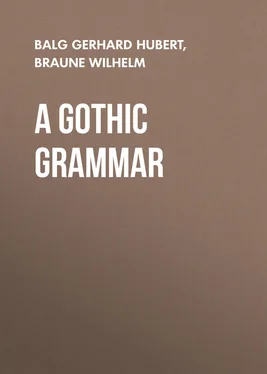Note 3. ofor ûoccurs only in ôhteigô; II. Tim. IV, 2 (in codex B, for ûhteigôin A).
Note 4. For ûbecuming aubefore vowels, s. § 26, b.
§ 16. Like Greek ει at the time of Wulfila, and in imitation of it, Gothic eidenotes long î.
Note 1. In Greek words eiuzually stands for ι, but also for ei, and sumtimes for η.
Note 2. Concerning eifor Goth. ê, s. § 7, n. 2.
Note 3. The difthongal pronunciation of eisuggested by J. Grimm is refuted also for linguistic reasons. Cp. J. Schmidt, 'Idg. Vocalismus', I, 485; Litbl. 1886, 485; Brgm., I, 57.
§ 17. eiin stem syllabls of Gothic words occurs especially in the prs. tense of the I. series ( § 30): beitan, to bite ; steigan, to mount ; þeihan, to thrive ; in the inflection of these verbs it interchanges with aiand i.
Other exampls: ƕeila, time ; eisarn, iron ; leiþu, cider ; þreis, 3 ; leihts, light ; weihs, holy ; skeirs, clear ; pronouns: weis, we ; meins, þeins, seins; – very often in formativ and inflectional syllabls; as, adjs. in -eigs( mahteigs, mighty ); in -eins( aiweins, eternal ); nomina actionis in -eins( laiseins, doctrin ); nom. and gen. sg. of the m. ja-stems: haírdeis, herd ; laisareis, teacher ; nom. pl. of the i-decl.: gasteis; opt. prt.: nêmeis; final, in feminins in -ei: managei( § 113); imperativs: sôkei, etc. ( § 186); the rel. particl ei( § 157), alone and in composition.
Note 1. eiis quite often represented by ê; as akêtis; Mt. XXVII, 48; wêhsa; Mk. VIII, 26. 27; akê; Gal. II, 14; izê; Mk. IX, 1. Lu. VIII, 13. 15, etc. – Here perhaps belongs also awêþi( § 7, e), which, however, occurs three times with ê: Jo. XVI, 16. I. Cor. IX, 7; cp. Beitr., 11, 32; 18, 286.
Note 2. Onse (in seiteina; II. Cor. XI, 28) occurs eibeside in(in sinteins, daily ; sinteinô, always ).
Note 3. Beside gabeigs, rich ( gabei, riches ), which occurs 5 times in Luke, also II. Cor. VIII, 9. Eph. II, 4 (in B), we find more frequently (11 times) gabigs(> gabigjan, to enrich ; gabignan, to grow rich ); cp. Brgm., II, 261. 271.
§ 18. In the pronunciation of iuthe stress is on the i, and uis a consonant.
Note 1. In Gothic words Latin writers render iuby eu, eo: Theudes, Theudicodo; Theodoricus. As to this, cp. Wrede, 'Wand', 100 et seq.; 'Ostg.', 167.
Note 2. In sium( § 10, n. 4), niu(interr. particl = ni-u, § 216) iuis dissyllabic, i. e. í-ú.
§ 19. iuis a normal vowel of the present tense of the II. series ( § 31), and here it interchanges with the ablauts au, u: biugan, to bend ; biudan, to offer . – In other words; as, þiuda, peple ; dius, animal ; liuhaþ, light ; diups, deep ; siuks, sick ; niujis, new ; niun, 9 ; iup, upward . – In formativ and inflectional syllabls iudoes not occur, except in the isolated ûhtiugs(I. Cor. XVI, 12. Cp. Beitr., 12, 202).
Note. In triu, tree ; qiujan, to quicken , etc., iuinterchanges with iwbefore an inflectional vowel: gen. triwis; prt. qiwida; cp. § 42.
aiin Gothic words denotes two etymologically, and certainly also fonetically, different sounds.
§ 20. I. The short vowel aí[= a in E. fat]. aiis uzed in Gothic to denote a short, open e 1-sound. In this case, according to Grimm's exampl, grammarians put an accute accent over the i( aí) in order to distinguish it from ái( § 21). Gothic aicorresponds to e or i in OHG. and in the other Germanic languages. The short e-sound represented by aíoccurs:
(1) before h( ƕ) and r, which sounds hav caused breaking of every preceding short ito e(aí; § 10, n. 3); e. g., aírþa, erth ; waírpan, to throw ; baírhts, bright ; faíhu, catl ; maíhstus, dung ; raíhts, right ; taíhun, 10 ; saíƕan, to see ; þaíhum(prt. pl. of þeihan, to grow ). (2) in reduplicated syllabls ( § 178et seq.): haíhald, aíaik, laílôt, saísô, etc. Cp. Osthoff, 'Zur Geschichte des Perfects', p. 276 et seq. Brugmann, IV, 15. (3) in the conj. aíþþau, or (= OHG. ëddo, ahd. gr. § 167, n. 11; cp. Beitr. 12, 211); probably, also, in waíla, wel (= OHG. wëla, ahd. gr., § 29, n. 4), but cp. Beitr. 11, 553.
Note 1. The law for the transition of ito aibefore hand r(so-calld breaking or refraction) is almost without exception, and equally concerns the Germanic i in general and the Gothic is ( § 10) in particular. The ibefore h, r, is retaind only in the following words: nih, ' neque ' (= ni uh), hiri, (cum) here! ; du. hirjats, pl. hirjiþ(219); and in the isolated forms: sihu, victory (cp. § 106, n. 1), þarihis(a probably corrupt form in Mt. IX, 16), adj. in gen. sg., not fuld (said of cloth). Cp. IF. 4, 334 et seq.
Note 2. Not every aibefore h, ris aí, but may also be the old difthong; e. g., þáih(prt. of þeihan, like ráis, prt. of reisan, but pl. þaíhum, like risum, § 30), áih, I hav ; áihts, property ; háihs, one-eyd ; fáih, deceit (Beitr., 12, 397); áir, erly (OHG. êr); sáir(OHG. sêr), sorrow ; áirus, messenger . Whether aihas the value of áior aícan in most cases only be inferd from the remaining Germanic languages.
Читать дальше











